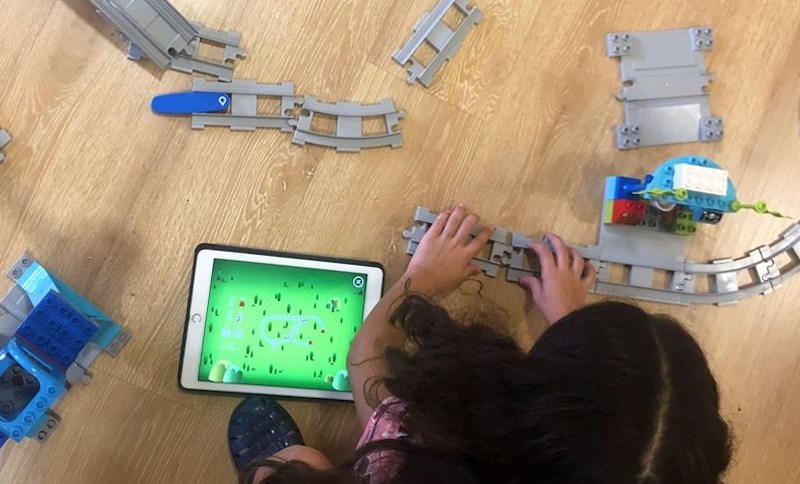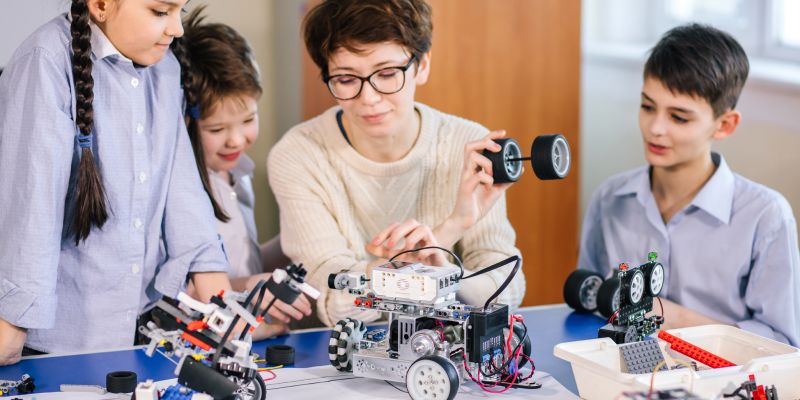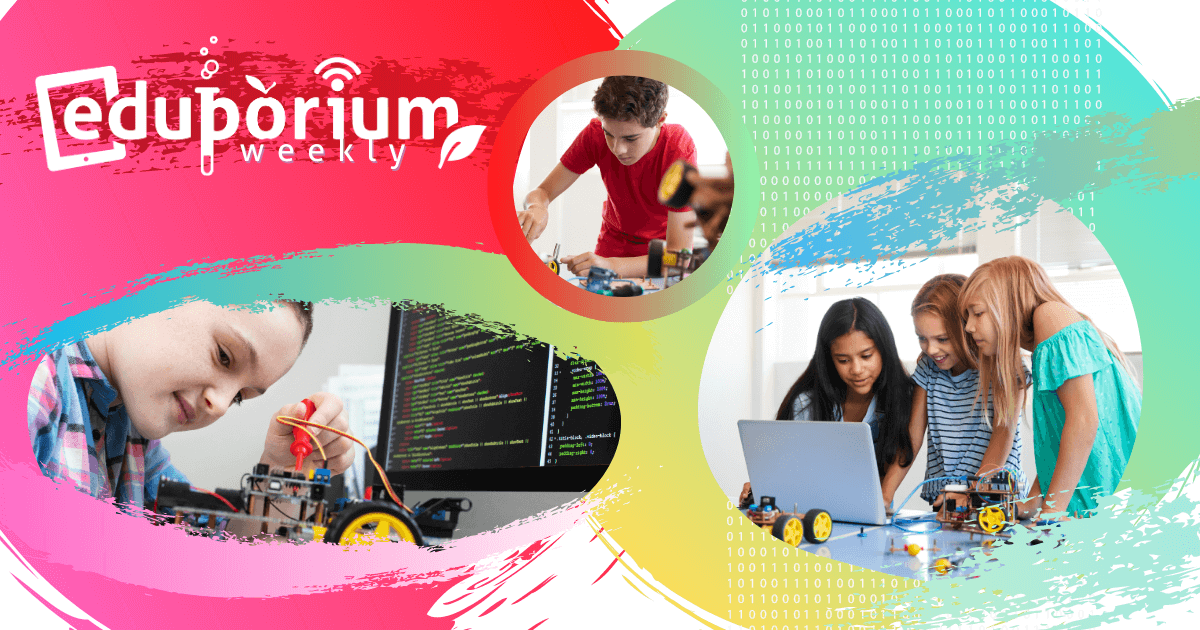Starting coding education programs in your school or district is equally exciting and challenging. If it's new to teachers and district leaders, however, it might also be overwhelming. There are many ways to go about it, however, and many different technologies that could help. The importance of providing children with the opportunity to develop key computer science skills is often the top priority. We also know how vital these skills could turn out to be for a large number of them. As the workforce continues to trend towards STEAM and computer science, empowering kids to explore these skills early (and perfect them often) could lead to a whole lot of potentially profitable opportunities for them in the future.
Why Coding Education is Important
Students may not go on to become programmers or computer science professionals but coding education can tremendously benefit them regardless. Even if they're not explicitly creating code for their future career, they can still utilize many similar thought processes. This method of analytical thinking truly helps so many of today's most innovative professionals come up with those game-changing ideas. And, this type of one-step-ahead thinking is one skill that students can learn from coding. Especially for young children, coding experiences can help them learn to think in new ways. Why is this? Coding is a new language after all. As they learn a new language, students are learning new strategies to communicate and also creating logical expressions that help them better understand their world.
Building creativity and math skills.
Also, with coding, children are constantly challenged with finding solutions. This helps them build creativity, trial-and-error, and perseverance skills as they solve problems. Even when students make a mistake during coding experiences, they discover what doesn't work at the very least. Having the courage to try new ideas can also lead to further creativity boosts as time goes on. Besides creative development, coding also helps students develop math skills. When creating programs, even those represented by graphical elements or in the Blockly language, students can start to visualize key concepts. They'll also start to make connections between math and coding and apply that creativity. We tend to forget, but that 'M' in STEM is also critically important and coding experiences help students better prepare.
More ways coding prepares today's students.
Another area in which coding experiences can help young students is in writing. You might not immediately recognize how close this connection is, but when they're coding, children are also learning how to organize their thoughts. They will see that they must present these in a logical order without getting too far ahead of themselves—something that's also important in good writing. Finally, coding helps many students develop confidence in their problem-solving methods. It helps them see that there can be more than one right way of solving a problem. It also gives them the chance to improve on their original attempts and refine those based on what they learned. This truly contributes to coding education going beyond STEM and it helps illustrate its value for today's students.
Boosting Soft Skills Through Coding Education
Of course, coding is always among the most in-demand skills of our time. It's not the only in-demand skill, however, especially in an era in which so much focus (and rightfully so) is placed on the soft skills. But, the great part about teaching coding is that children often develop those key soft skills concurrently. When we think about soft skills, we typically tend to think of things like communication, collaboration, teamwork, or problem solving. Each of these very much tie in to the coding experiences that students may have in their classrooms. Group coding challenges also require them to collaborate with peers. In order to collaborate, they need to communicate clearly. When communicating and collaborating, they are working as part of a team and, one way or another, finding a way to solve the problems in front of them.
Working on learning from failure.
Aside from this problem solving, coding also helps students learn to develop resilience. It is fairly rare that programmers, including students, get the exact results they want on the first try. Those initial attempts are very valuable learning opportunities, however, as they help children see that failure is not bad. At the same time, knowing what works and what doesn't allows students to constantly monitor their code while looking for ways to improve it. Thinking a couple moves ahead helps them to recognize and address shortcomings before they become irreversible problems. When coding in the classroom, kids might begin with a vague idea and apply their creativity to make it effective—showing how their soft skills develop along the way.
Developing confidence through coding.
Going in a bit of a different direction, coding also helps kids realize that they don't need to fear technology. Beyond that, it can even help them to see that they won't need to fear subjects like math, either. Coding is arguably a more in-depth version of math and helps students learn to visualize, analyze, and organize data. When they see that they're very much capable of this, their confidence can skyrocket. In turn, children can start to use that confidence in math exploration and in other subjects in the curriculum. Essentially, coding helps give students confidence, a soft skill that goes a long way in the 21st century.

Coding Skills and the Emerging Workforce
It's been the case for years now and there's no sign of things letting up. The number of unfilled STEM jobs remains in the millions and, as the world gets more advanced, may only grow. According to research, over 70 percent of STEM jobs reside in various computer science fields. At the same time, just eight percent of graduates earning a STEM degree have earned it in computer science. That, of course, presents an issue, particularly for members of the computer science industry who need talent. It also presents a problem for graduates, who might realize too late that they could have potentially had their pick of computer science jobs. It starts, however, with introducing them to coding education and these possibilities early in life.
Building a CS background.
The amount of unfilled coding jobs is staggering but the responsibilities programmers have are also equally intriguing. As they start to develop their coding skills, kids of any ages improve their chances of an exciting career. Since programmers are in such high demand, developing computer science skills can potentially be very advantageous. With a stronger background in programming, children will also have a better time when accessing their own creativity, persistence, and communication skills whenever they need them for trying to solve problems. Since there is such a gap when it comes to the number of computer science graduates and the number of computer science jobs, the odds can certainly be favorable for students who choose to pursue coding. They need the skills and the foundation, however, in order to start down that path.
The right skills to succeed.
Just think about how much we now use technology in our lives. From games and maps to productivity and other apps, these tools all need to be developed. New apps keep emerging in various digital libraries every single day and the world needs more programmers to make them better and more user-friendly. Especially for children who have grown up in the age of technological innovation, they might more readily know what they want from a mobile app. Learning coding skills and the techniques in school can help students better understand the world and how computer science fits in. It can also help them excel in the future workforce with a genuine understanding of the role coding can play.
21st Century Education Includes Coding Education
Teachers all around the world work tirelessly to provide their students with a '21st century education.' This phrase means different things to different educators, students, and parents. It also varies depending on the resources educators have available to them. As time has gone on, however, it's become fairly clear that the literacy of the 21st century is coding and, as such, coding education should absolutely be a cornerstone of the 21st century education experience. Whether children go on to pursue computer science or not, each of them should have the opportunity to learn the skills. Like with all innovative educational initiatives, however, it can come down to access, infrastructure, and money.
Learning computational thinking skills.
Another one of the most relevant skills children often learn through coding is computational thinking. This process involves solving problems in the same manner as a computer scientist. By breaking every problem down into more manageable chunks, children are then better equipped to understand the essence of each problem, apply logic to designing a solution, assess patterns, and draw conclusions about the best way to solve it. When they're creating programs—no matter how simplified they are—kids are often making use of computational thinking. It's similar to thinking one step ahead and computational thinking, in particular, is a very valuable 21st century skill that can certainly come as a byproduct of coding education.
Equipping students with the skills they need.
Since students are exposed to so much technology, it's tough not to create 21st century opportunities that allow them to explore the skills needed to excel in a tech-driven world. We know that coding skills are near the top of the list and more computer science professionals are needed. So many jobs today require these applicants have some sort of coding skill set—even if it's not the main focus of every job. If someone does decide to apply for a new job and sees that in the description, they might shy away and believe they're not qualified because of this one requirement. One way to alleviate that is with an earlier introduction to coding education. If educators can teach students these top 21st century skills, it can help address this pervasive gap. We know what the data says, so it's imperative to provide as many opportunities as possible.

Coding as a Fundamental Literacy
We've made our position on coding education quite clear over the years, even advocating for as much CS learning as possible at conferences, in presentations, and through the messaging we've shared online. By the same token, however, we see that, realistically, it's tough to create coding experiences for every single student. Heck, not every single student likely even wants to participate in coding education. The biggest reason it's so important, however, is that it's such a huge part of today's world. But, beyond that, learning to code in school opens up a whole lot more than the chance to develop new computer science skills and explore opportunities. Coding is a literacy of both the present and of the future and, though maybe it isn't for everyone, those who want to explore it should have the chance.
Comparing coding to writing.
In an interview with the Edutopia team a few years ago, MIT professor, Mitch Resnick, shared his thoughts on the role of coding education across the K-12 landscape. We bring this up since some of what he had to say really stuck with us and seemingly remains just as relevant over four years later. He made a good point about coding opportunities being available in every school in an ideal world. Though it's not for every child, it has become such a crucial literacy. He compared this with teaching writing and how we teach all children to write. That's because knowing how to write better equips us to communicate. This comparison between writing and coding isn't incredibly far off. When we think about it, coding allows these computer scientists to communicate with machines to maximize efficiency as they solve new and more complex problems.
Why should students learn coding?
At first glance, the answers to this question may seem obvious. Like so many other 21st century education questions, however, there are infinite branches extending from the tree. Yes, coding skills may increase the chances of students moving into a strong STEM career. It also, however, allows them to learn those crucial skills while simultaneously absorbing other key components of development. When coding, they're always working on unique projects—and they often become passionate about these processes and achievements. Coding also allows kids to collaborate and, in many instances, experience some growth while also playing games. Combining projects, passion, peers, and play, as Resnick says, offers a great viewpoint of coding education. It's a perfect starting point and can inspire kids to seek coding opportunities moving forward.
For the latest EdTech, STEM, and 21st century education news, follow us on Twitter/X or Instagram. Like us on Facebook, too, or sign up for our newsletter for the latest product announcements and offerings. If you have an idea for an Eduporium Weekly theme, send us a message on social media or comment below.




2 Comments